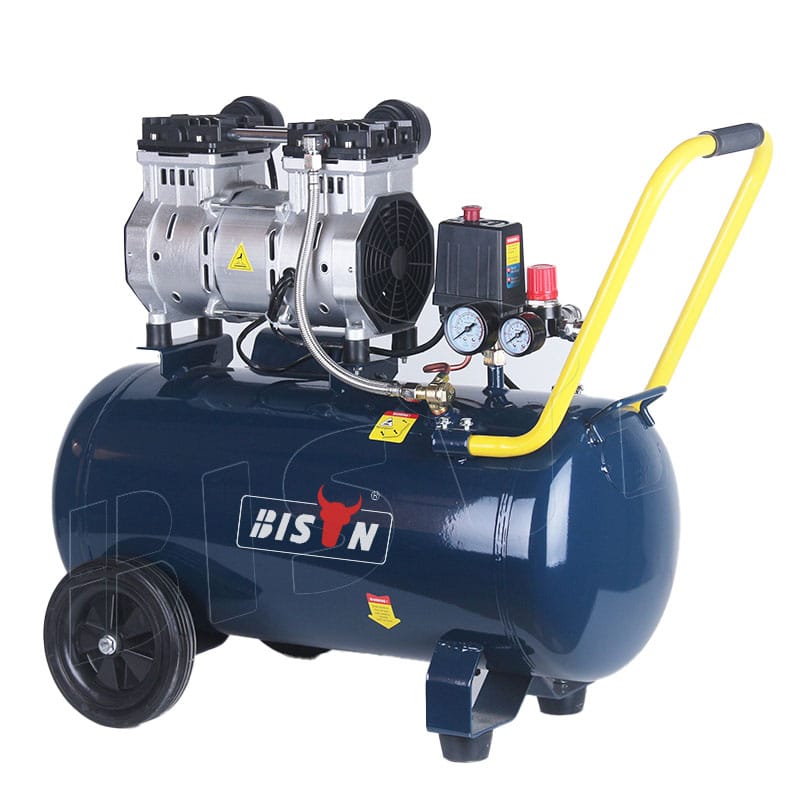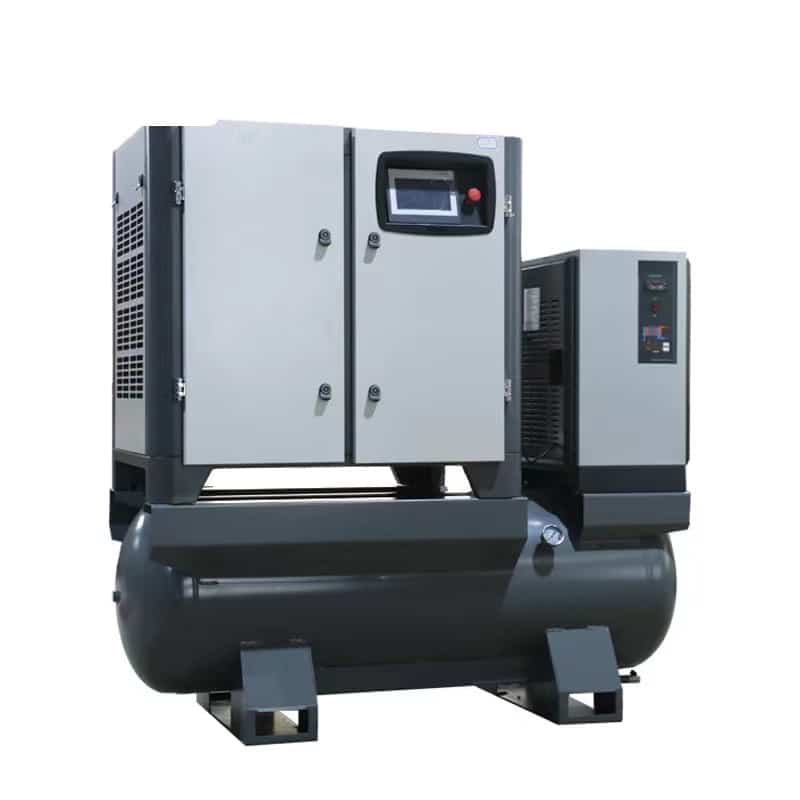air compressor blog
Electric vs Gasoline air compressors
- Nov 21, 2023
Electric air compressors and gasoline air compressors have different application ranges. So it’s hard to rule out the possibility that one is better. As a professional air compressors manufacturer, BISON glad to introduce it for you. In this article, we have highlighted some crucial facts about gasoline compressors vs electric compressors.
Environmental impact of electric vs Gasoline air compressors

Many machines are opting for electric rather than gasoline drive due to their lower environmental impact. Using an electric air compressor will reduce the negative impact on the environment as fewer harmful greenhouse gasses are released into the atmosphere.
The combustion process in a gasoline engine produces harmful chemicals and toxins in the environment. Running these machines contributes to air pollution, greenhouse gasses, carbon monoxide, and particulate matter.
The contribution of harmful chemicals is much lower than that of larger gasoline machines, but if environmental impact is a significant concern, an electric air compressor is a greener choice. Air compressor manufacturers are improving their technologies and product lines to increase energy efficiency and reduce environmental impact.
Industrial air compressors such as rotary screw air compressors have far more detrimental effects on the environment than air compressors used on a small scale by most consumers. Large-scale use of electric or gasoline air compressors still favors electric in terms of emissions and environmental impact.
Safety issues of electric air compressors and gasoline air compressors
The risks associated with using an air compressor vary depending on operating conditions. Electric air compressors are generally safer to operate because they do not rely on flammable liquids and draw in toxic gases.
Here are some precautions you should take when operating a gasoline air compressor:
- Always follow the instructions specified by the manufacturer to ensure safety during operation.
- Avoid poorly ventilated, enclosed, and confined spaces, as this can result in significant exposure to toxic chemicals.
- Add gasoline only when the air compressor is not running, and the engine has had a chance to cool; this will avoid fire or explosion.
- Not only do you have to watch out for explosions and gas-related incidents, but the emissions from using a gasoline air compressor can also be harmful if inhaled. Operate gasoline compressors outdoors where there is no risk of ventilation. Inhaling high levels of carbon monoxide is dangerous and can cause illness and, in the worst cases, death.
There are safety concerns with electric air compressors, but they are similar to any electrical device. The compressor must be plugged into a properly grounded outlet to prevent damage to the machine or fire. Electrical fires can occur due to sparks generated by insufficient sockets. Also, limit the use of long cords to prevent injury or danger in the workplace.
You should be aware of the environment in which you operate your electric or gasoline air compressor. The highest safety standards, as well as equipment inspection and maintenance, are of paramount importance for both machines. Excessive pressure levels can cause the compressor vessel itself to rupture or explode.
Noise levels of electric air compressors vs. gasoline air compressors

In practice, one of the most apparent differences between electric and gasoline air compressors is the level of noise they produce. Advanced technology has made compressors quieter, but gasoline air compressors are much noisier because they rely on engine combustion and more moving parts than quiet-running electric motors.
Air compressor sound levels range from 40 to 100dB, a huge range. Prolonged and frequent use of loud machines can negatively affect your hearing. Regular gasoline-powered air compressors are more likely to cause hearing loss than electric air compressors.
These are the different noise levels and characteristics of electric and gasoline compressors:
Electric air compressor noise
You can find compressors as low as 40dB, equivalent to a quiet room or a walk in the suburbs at night. Advances in motor technology have made these machines significantly less noisy.
Gasoline compressor noise
Gasoline compressor noise levels will fall on the higher end, with larger compressors falling around or just above 85 decibels, comparable to city traffic or a lawn mower. Anything over 85 dB is considered harmful.
For a quieter air compressor, electric is the best choice. Given the high-intensity sound that most air compressors produce, there are ways to protect yourself and limit your air compressor noise levels. Ear protection is recommended when operating machinery at close quarters, especially pneumatic equipment.
Other noise reduction solutions for air compressors include:
- Put rubber under the compressor or cover the motor with rubber to absorb vibrations that can increase the noise level.
- Creating an enclosure made of sound-deadening material will reduce noise output levels.
- Install a better air intake or filter housing.
Taking any of these precautions will help reduce the noise level of your air compressor. If you want to know more about how to reduce air compressor noise, please check our blog How to make air an compressor quieter.
As a manufacturer of air compressors, BISON also offers a range of silent air compressors for those currently seeking such equipment. If you are currently looking for silent air compressors, contact us right now.
Power supply and output for electric and gasoline air compressors
The most notable difference between these two air compressor types is how they are powered. As the names describe, electric compressors need to be powered from an electrical outlet, while gasoline compressors run on petrol to run – the power source affects transportability.
Electric air compressors require a nearby power source to operate. Usually not a problem for most pneumatic jobs, primarily if you use them for homework or auto repair. There may also be generators nearby to provide power for various tools needed.
In rural areas or where you are far from a power source, gasoline air compressors make a helpful alternative to electric air compressors. Relying on gasoline makes it easy to carry anywhere, and a gasoline air compressor is the more portable of the two options. But gasoline compressors are usually much heavier because they are connected to a gasoline engine rather than a much lighter electric motor.
Both compressors are available in a variety of sizes and offer similar power outputs unless you opt for a larger gasoline engine that produces more horsepower. The duration of the pressurized air also varies. Unlike electric, gasoline air compressors keep running at the ideal pressure zone while using gas. The electric compressor shuts off automatically when the pressure drops.
Electric air compressor vs gas air compressor price points
Many consumers are price sensitive when deciding on power tools. Investing in an expensive piece of equipment used frequently or purchasing an air compressor will cover the needs of infrequent use. Electric air compressors are generally cheaper and more commonly used than gasoline air compressors.
The lower price points for electric air compressors are attributed to cheaper technology and smaller, more compact machines. Gasoline air compressors are usually larger and heavier and come with a motor. Not only do you need to consider the more substantial initial investment of a gasoline air compressor, but you also need to consider the recurring fuel costs.
Remember, the bigger the compressor, the more powerful it will be and, therefore, the more expensive it will be. Pricing for air compressors within the same power category varies widely based on the size of the compressor and the pressure and power it produces. Compare electric and gasoline tools of the same wattage and size.
You can pay nearly twice as much for a gasoline air compressor as an electric one. But this may be a necessary trade-off and worth the extra cost in environments where electricity is not readily available or where the job requires high power from large motors that are impossible with locally available power sources.
Energy efficiency of electric air compressors vs. gasoline air compressors
In the context of air compressors, energy efficiency measures the difference in energy costs to perform similar jobs. Electric air compressors come in many variants, some of which are specifically designed for increased levels of efficiency.
Most gasoline air compressors run on gasoline because natural gas air compressors are commonly used in:
One option is not necessarily more energy efficient; instead, they use energy differently, resulting in higher or lower costs depending on your usage. Electricity is often a cheaper option compared to gasoline.
For your project, you’ll need to estimate the amount of work that needs to be done and compare that to electricity and gasoline costs. An electric air compressor’s main benefits are the lower initial price and the fact that you don’t pay for regular fuel. Your energy bills will increase, but only significantly if many devices are running frequently.
Most consumer gas-fired air compressors will run on gasoline, which is less energy efficient and more costly than similarly sized and rated gas- and electric-powered air compressors.
Advantages, disadvantages, and applications of electric air compressors
Electric compressors are equipped with many intelligent features. You can use a computer to precisely control the operation and program it according to your needs. However, they may only provide the best solution for some scenarios.
Electric air compressors require a stable and sufficiently robust power source. You can’t run an electric compressor through a standard extension cord. Also, even if you have power, you need a good backup power source in case of a power outage.
Therefore, electric scroll compressors are more suitable for delicate indoor operations.
Advantages, disadvantages, and applications of gasoline air compressors
Another important fact is that you cannot use a gasoline air compressor in an enclosed place. You must ensure proper ventilation. Because gasoline air compressors release flammable, harmful by-products into the air. Additionally, improperly handling the oil tank that powers the air compressor can cause serious accidents.
Despite all of these disadvantages, a gasoline air compressor may be a better choice in some situations. They are common in many industries that operate on a large scale. Gasoline is relatively cheap and is a good source of energy.
Gasoline air compressors are a good option for remote locations.
Now that you understand the gasoline compressor vs. electric compressor debate, you know precisely what compressor you need. If you’re ready to make the call, contact BISON to help match you with the best compressor for your needs.
Check BISON Machinery Air Compressor Catalog to find more.
What types of air compressor parts does BISON manufacture?
Now that you understand the gasoline compressor vs. electric compressor debate, you know precisely what compressor you need.
BISON Machinery Manufacturer is a professional air compressor manufacturer in China. We are committed to providing high-quality OEM air compressors to customers around the world. With excellent manufacturing capabilities and core technology, BISON is able to produce products that meet customer needs according to their needs.
If you are looking for air compressor manufacturers, we welcome you to contact us. BISON have experienced professionals and advanced equipment, and have accumulated many years of experience in air compressor manufacturing. The air compressors produced by BISON comply with the necessary certification standards such as ISO 9001 and ISO 13485.
frequently asked questions about Electric vs Gasoline air compressors
When is a gasoline air compressor a better choice?
Gasoline air compressors are known to be highly efficient, and fuel is also readily available.
Unlike electric compressors, gasoline compressors have several disadvantages. They are often quite noisy when operating, making them unsuitable for medical, hospital, home, or office environments. However, they are very efficient, and gas compressor technology is more common in larger compressors.
When is an electric air compressor a better choice?
Electric scroll compressors are versatile and suitable for any application. Electric compressors usually run smoothly, without noise or polluting the compressed air. An oil-free scroll compressor is an excellent example of this type of electric compressor.
Electric air compressors are also easy to move due to being more compact and lightweight. The electric compressor does not require additional fuel or power storage units. Therefore, they are relatively safer, with the most negligible potential hazards in the work area.
How long does an electric air compressor last?
Electric air compressors are known for their durability. In fact, in some cases, they can last up to ten years.
This is because they are made from electrical components that require little maintenance and are not prone to corrosion.
This is critical because most air compressors that require maintenance are damaged by corrosion due to owners forgetting to add oil.
Can an electric air compressor be run indoors?
Yes, you can safely run an electric air compressor indoors. You need to make sure that the area is well-ventilated and that the air compressor is made by a reliable brand such as BISON.
This is key to ensuring that your air compressor doesn't emit dangerous combustion gasses or malfunction, putting you and anyone nearby at risk.
If you have any enquiries about the BISON air compressor, we would love to hear from you.












